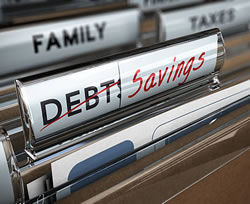Ben Nash* says getting out of debt as quickly as possible could be about more than just throwing money at the problem.
 Trying to get ahead with money while carrying a bunch of debt is like trying to fill a leaky bucket, you take two steps forward and one step back.
Trying to get ahead with money while carrying a bunch of debt is like trying to fill a leaky bucket, you take two steps forward and one step back.
But there are some tools and strategies you can use to make faster progress, ditching your debt.
Use competitive products
The first thing you can do to help you to pay off your debt faster is to get the best deal on your debt products.
Credit card and personal loan markets are super competitive, so reviewing your existing borrowing products can help you save interest costs and reduce the amount you owe.
The trap to look out for if you take out a new loan as a result of a comparison is extending your loan term, which happens if you replace one loan with another that has a longer repayment term.
Because your payments are spread over a longer timeframe, if you only make the minimum payments, you can end up paying more interest over the life of the loan.
But, this can be avoided if you keep up higher repayments and pay down your debt ahead of the standard loan term.
Balance transfers
If you’re paying standard interest rates on a credit card, you’re probably paying hundreds or even thousands of dollars more than you have to every year.
These days most banks offer balance transfer deals that allow you to ‘move’ existing credit card debt to a new credit card at a low or 0 per cent interest rate.
Balance transfers can be a great way to eliminate dead interest costs, so every dollar you pay is reducing the amount you owe.
You need to be disciplined, but this can be a great way to ditch your debt faster.
If you go down the balance transfer path, there are a couple of things to look out for.
The first is to choose a balance transfer card that has a low (ideally no) annual fee.
The other cost to watch out for is balance transfer fees, where some providers will charge a percentage of the balance you’re transferring as a fee.
Both of these can mean substantial additional costs, and because the market is competitive for these products you can likely avoid some of these costs with a bit of research.
Refinancing your mortgage
With property prices sky-high around the country and the average mortgage value in Australia getting higher and higher, reducing your mortgage interest can free up cash to repay your debt faster.
Mortgage markets are competitive and constantly changing, so if it’s been a while since you reviewed your mortgage, you could be leaving money on the table.
I suggest reviewing your mortgage on at least an annual basis to make sure your deal is sharp.
If you’re going to refinance your mortgage, there are a few potential traps to look out for.
First, check the refinancing fees, which normally range between $500 and $3,000.
The rough rule of thumb is that if you refinance your loan, you should aim to have saved back your refinancing costs within 18 months, ideally sooner.
Also, check you’re not extending your loan term when you refinance.
If you refinance to a new 30 year or full term mortgage, you’re effectively spreading out your repayments over a longer time period and will often end up paying more interest.
#Protip: sometimes if you find a better deal with a competitor your current mortgage provider may match the rate to keep your business.
This can allow you to get a cheaper loan without going through the paperwork to change your mortgage.
If you find a good rate with a competitor, call your bank and tell them the specific deal you’ve found and ask them whether they’ll match it to keep you as a customer.
It can’t hurt to ask, so go for it!
Consolidating your debts
If you’ve got multiple personal debts, consolidating can streamline your debt into one single repayment.
And, if you get a good deal on your loan, it can reduce your interest costs and free up cash to make faster progress reducing your balance.
Again, personal loan markets are competitive so shop around for a deal that suits you best before making any changes.
Where you have personal debts and a mortgage, another option to reduce your fixed repayments and interest costs is to consolidate the debt into your mortgage.
Because the interest rate on a mortgage is generally lower than the rates on personal debts, consolidating can reduce your interest costs.
This means more of your repayments are paying down the amount you owe instead of just covering the interest costs.
If you go down this path, you should be aware that moving personal debts into a mortgage or consolidated personal loan will generally mean extending the loan term, and that repaying debt over a longer period will normally mean paying more interest over the life of the loan.
If you use this strategy, you should keep up your payments or use a strategy like cascading debt repayments to, so you don’t pay more interest over time.
General traps and risks
As well as the potential traps to be aware of with the options above, each of these debt strategies have two main risks you should be aware of.
These are; the impact on your credit score, and the debt trap.
Impacting your credit score: Applying for any new loan product and/or potentially changing existing products may create a credit enquiry on your file which can impact your credit score and credit file.
You want to have the best deal possible, but at the same time you should be strategic, so you don’t have a constant stream of credit enquiries.
Look for products that will be suitable for you over a longer time period, so you don’t have to switch as often.
And make sure you know your credit score and how your credit score is calculated, so you don’t run into the unexpected.
Also, you should be aware that there is no industry standard for credit scores and the credit score that may be obtained from one provider will be different from another.
Debt trap: The second potential risk is present when you replace or consolidate any debt.
If you take out or increase one debt to pay off another, there is the temptation or risk that if you don’t close out the debt you were ‘replacing’, you can fall into the trap of continuing to use the credit card or loan product.
If this happens, while you might be getting a better deal on your initial debt, your overall debt would have increased, and you’ll end up worse off.
Make sure you’re disciplined when you make these changes to cut up the old credit cards and close down the accounts, so you aren’t tempted to use them.
The wrap
Getting out of debt can be tricky, and if you don’t have a good strategy, it can be slow-going.
The options above can help you get there faster, but they’re not without their potential downsides.
To make real progress with debt, you need to be disciplined.
You should focus on your goals, celebrate your wins, and importantly don’t give into temptation.
Make a commitment today to crush your debt, and I guarantee your future self will thank you for it.
*Ben Nash, financial adviser and founder of Pivot Wealth, and the Author of the Amazon Best Selling Money Guide, Get Unstuck.
This article first appeared at getcreditscore.com.au.











